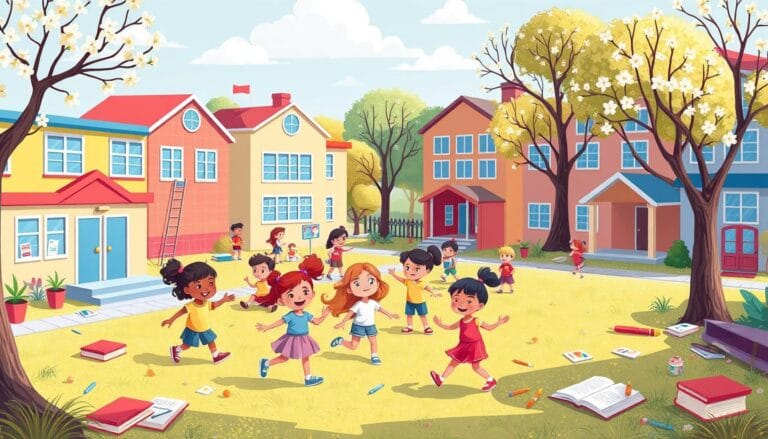best Strategy for raising a child from 1 year to 5 years
Parenting from ages 1 to 5 is a deep and rewarding journey. This guide gives you key strategies for your child’s growth. It covers physical, cognitive, and social-emotional milestones. By knowing your child’s needs, you can create a supportive environment for their growth.
As your toddler grows, you’ll see big changes in their skills, interests, and personality. This guide will help you understand and support this exciting time. It ensures your child grows well and that you enjoy every moment of their development.
Key Takeaways
- Understand the crucial developmental milestones from 1 to 5 years of age
- Create a nurturing environment that supports your child’s physical, cognitive, and social-emotional growth
- Develop effective strategies for enhancing language, communication, and motor skills
- Foster emotional intelligence and healthy social connections in the early years
- Explore evidence-based educational approaches to support your child’s learning and development
Child Development Stage from 1 Year to 5 Years: Understanding the Journey
As your child moves from being an infant to a preschooler, you’ll see big changes. They’ll grow physically, think more clearly, and learn to interact with others. This time is key for their future success. Let’s look at the important milestones and patterns you’ll see on this exciting journey.
Physical Growth Patterns and Expectations
Your child will grow taller and heavier, gaining about 2-3 inches and 5-7 pounds each year. They’ll get better at moving, like running and climbing. They’ll also learn to do simple things by themselves, like dressing and eating.
Cognitive Development Milestones
Your child’s thinking will get stronger, and they’ll learn more words, remember things better, and solve problems. They’ll start asking lots of questions and play make-believe. They’ll also learn about colors, shapes, and numbers. Encouraging their curiosity and giving them chances to learn will help them grow.
Social-Emotional Progress Markers
This stage is also important for your child’s feelings and how they interact with others. They’ll want to do things on their own and feel close to family. They’ll also learn to share and understand their own feelings. These are big steps in their social and emotional growth.
Knowing what to expect from 1 to 5 years helps you support your child. By paying attention to their unique journey, you can help them reach their highest potential.
Creating a Nurturing Environment for Your Toddler’s Growth
Creating a supportive and stimulating environment is key for your toddler’s growth. By setting up learning spaces and routines, you encourage exploration and growth. This helps your child develop in a positive way.
Start by setting up special areas in your home for play and learning. Use early childhood education ideas to create a cozy reading nook, a creative arts station, and a safe area for movement. Make sure these spaces are organized, easy to get to, and match your child’s interests and skills.
Being consistent is important for social-emotional learning. Create a daily routine with structured activities, meal times, and rest. This makes your toddler feel safe and helps them develop emotionally.
- Start a calming bedtime routine to help with sleep.
- Encourage your child to explore and play on their own, but also offer guided activities to help them learn.
- Make sure your child gets to play outside and enjoy nature. This is good for their physical, cognitive, and social-emotional learning.
Most importantly, aim to create a loving and positive environment for your toddler. This way, you’ll support their growth and development in these important early years.
Essential Skills Development: Language and Communication
Helping your child learn new languages and communicate is key in their early years. As they grow from one to five years old, you’ll see big steps in their speaking, reading, and language skills.
Speech Development Timeline
Children usually follow a set timeline for learning to speak. By 12 months, they can understand simple words and might say their first words. Between 18 and 24 months, their word count grows fast, and they start making simple sentences.
By age 3, they can have real conversations. And by age 5, their language skills are strong.
Reading and Vocabulary Building Activities
- Read aloud to your child often, using fun books and pointing out new words.
- Help your child “read” by looking at picture books and talking about the pictures.
- Sing songs, recite nursery rhymes, and play word games to grow their vocabulary.
- Take your child to different places and experiences to teach them new words.
Communication Enhancement Strategies
To help your child’s language and communication, try these tips:
- Talk often and meaningfully, answering their questions and listening to them.
- Show them how to speak correctly, gently fixing any mistakes.
- Encourage them to share their thoughts, feelings, and needs through words and actions.
- Make your home a place where language is rich by talking about your day and the world.
By supporting your child’s language and communication in these early years, you’re helping them succeed in school and grow their mind.
Physical Development and Motor Skills Enhancement
Helping your child grow physically is key in the early years. From 1 to 5 years old, they will make big strides in fine motor skills and gross motor skills. These skills are vital for their health and help with learning, socializing, and feeling emotions.
Fine motor skills are about using small muscles, like when you grasp or pinch things. Fun activities like puzzles, coloring, and using kid-safe scissors can help. Gross motor skills, however, are about big muscle movements, like running or climbing. Playing outside and using playgrounds are great ways to improve these skills.
- Engage your child in age-appropriate activities that challenge their fine motor skills, such as:
- Stacking blocks or cups
- Scribbling with crayons or markers
- Stringing beads or cheerios
- Threading laces through holes
- Encourage gross motor skill development by:
- Taking your child to a park or playground
- Playing catch or other ball games
- Organizing dance and movement activities
- Providing a safe indoor space for running and jumping
Every child grows at their own pace. So, be patient and celebrate their small wins. By focusing on both fine motor skills and gross motor skills, you’re setting them up for success in all areas of growth.
| Fine Motor Skills | Gross Motor Skills |
|---|---|
| Grasping objects | Running |
| Manipulating small items | Jumping |
| Coordinating hand-eye movements | Climbing |
| Developing hand strength | Balancing |
Building Social and Emotional Intelligence in Early Years
As your child grows from 1 to 5 years old, it’s key to focus on their social and emotional skills. This time is vital for them to learn how to connect with others, express themselves, and feel good about themselves. Let’s look at ways to help them grow in these important areas.
Understanding Emotions and Self-Expression
Toddlers are figuring out how to feel and talk about their emotions. They might feel happy, excited, frustrated, or scared. Help your child by asking them how they feel, showing them how to express emotions, and reading books that match their age.
Developing Empathy and Social Connections
Teaching your child to care about others and make friends is crucial. Encourage them to think about others, share, and play together. When they’re kind or solve problems, be sure to praise them. This helps them learn to get along with others.
Managing Behavioral Challenges
Dealing with toddler behavior can be tough. Stay calm and set clear rules. Use positive words, redirect their attention, and teach them about consequences. This helps them learn to control their actions and solve problems.
Every child is different, and growing up can have its ups and downs. By helping your child understand themselves, care for others, and handle tough times, you’re preparing them for a lifetime of strong relationships and emotional balance.
Conclusion
As you’ve supported your child’s growth from 1 to 5 years, you’ve learned a lot. This guide has shown you the child development stage from 1 year to 5 years. It highlighted the exciting physical, cognitive, and social-emotional milestones your child will reach.
You’ve created a supportive environment and focused on key skills. This has set a strong foundation for your child’s growth. You’ve looked at important areas like language, physical development, and emotional intelligence. These are crucial for preschool development and your child’s journey.
Remember, every child is different, and their progress may change. Face challenges, celebrate wins, and keep supporting your child. With love, guidance, and resources, you can help them grow into curious, confident, and well-rounded individuals.
Don’t hesitate to see other articles on my bloghttps://www.skillsraisingkids.com/
FAQ
What are the key physical growth patterns and expectations for children aged 1 to 5 years?
Kids this age grow a lot in height, weight, and motor skills. They learn to move their bodies better and get better at fine and gross motor tasks. Watching their growth helps you know they’re doing well.
How can I support my child’s cognitive development from 1 to 5 years old?
Doing fun learning activities and reading together helps a lot. Also, solving problems and exploring new things boosts their brain power. This helps them grow smart and curious.
What are the key social-emotional progress markers during the early childhood years?
Kids from 1 to 5 get better at showing feelings and making friends. They start to play make-believe and connect with others. Helping them understand their feelings and make friends is key.
How can I create a nurturing environment to support my child’s growth and development?
A safe and fun place is important for kids to grow. Make sure their learning areas are right for their age. Also, keep routines and be supportive to help them explore and learn.
What are the key milestones in language and communication development for children aged 1 to 5 years?
Kids this age talk more and better. They learn new words and start conversations. Reading and talking with them helps a lot.
How can I enhance my child’s fine and gross motor skills?
Fun physical activities help kids get better at moving. Try things that improve hand-eye coordination and strength. Playing and exploring helps a lot. For more exercice https://www.gobabygym.fr/#:~:text=pour%20tous%20les%20enfants%20!,%2C%20organis%C3%A9%2C%20attrayant%20et%20ludique.
what are the strategy for raising a child emotionally ?
Teaching kids to feel and express emotions is important. It helps them understand others and manage feelings. Activities that teach self-awareness and empathy are great.




